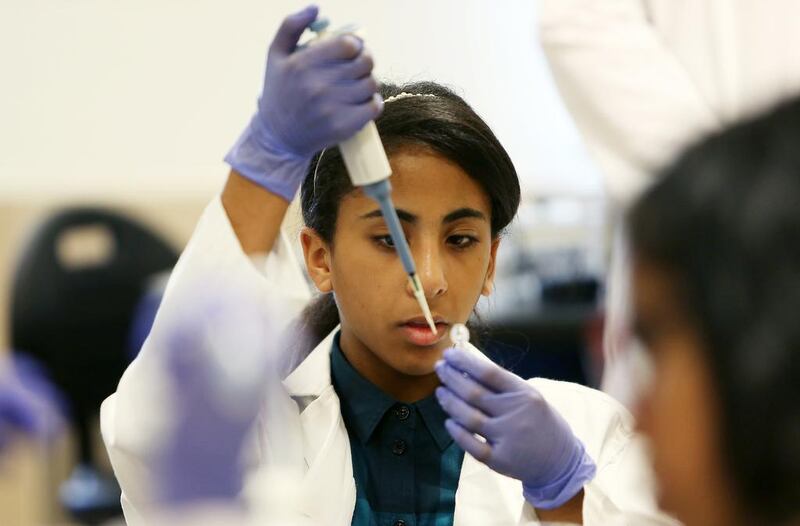ABU DHABI // There is a crisis on the International Space Station – some of the astronauts have been struck down with food poisoning.
Your mission – a DNA experiment in space to find out whether it was the sushi or burgers that were tainted with e.coli.
That was the problem put to pupils and teachers at the Genes in Space workshop at the Emirates College for Advanced Education yesterday.
It offered advice for pupils to fine tune their entries in the Genes in Space competition, the winners of which will have their experiments tested by astronauts on the ISS.
The seminar started with a presentation about the space station and the type of experiments conducted on board.
Pupils could then bounce their ideas off the co-founders of the miniPCR, a portable DNA lab that can carry out molecular biology, genetics and biological engineering experiments.
The ideas included studying the effect of cosmic radiation on cancer cells, researching microgravity’s effect on vestibular ataxia – a condition in which astronauts’ balance, vision, and eyes are affected by space – and reproduction of plants in space.
After the session, teachers and pupils had the chance to learn about the technologies that will be used by the astronauts.
One pupil who has already had three experiments sent to space said working with the miniPCR would go a long way to help put another into orbit.
“This is my first time using the machine. It’s very exciting,” said Anoushka Ghosh, 13, of Gems Modern Academy Dubai. Her experiments on effects of microgravity on soft contact lenses, battery life and seed germination were sent to space this year as part of Nasa’s 2015 Cubes in Space.
Maitha Al Kitbi, a laboratory technician at Al Sariya school in Sweihan, said she used a PCR machine in her previous job at a hospital laboratory, but had not had the chance to use the mini version. “The children will no doubt benefit from experimenting with it,” she said.
The competition, organised by the UAE Space Agency, The National and Boeing, allows pupils from Years 7 to 12 to design an experiment that addresses real challenges in space exploration.
Mohammed Al Otaiba, The National’s Editor-in-Chief, said the event allowed those attending to expand their knowledge of space and microbiology, while gaining first-hand experience in the use of latest technology.
“This is a one-of-a-kind workshop for a one-of-a-kind space contest, which will generate excitement not only among those here but everyone involved in the competition,” Mr Al Otaiba said.
Chief innovation officer at the UAE Space Agency, Sheikha Al Maskari, said she was astonished by the level of curiosity and knowledge the pupils had.
“One of our main goals at the agency is to develop human capital and promote STEM learning and education and we think this competition is going to add a lot of value,” she said.
Ezequiel Alvarez-Saavedra, one of the miniPCR founders, told pupils theirs was only the second Genes in Space contest in the world. The other is in the US.
Submissions for Genes in Space start on September 1 at genesinspace.org. For details follow #genesinspaceuae or visit thenational.ae/uae/genes-in-space
tsubaihi@thenational.ae






